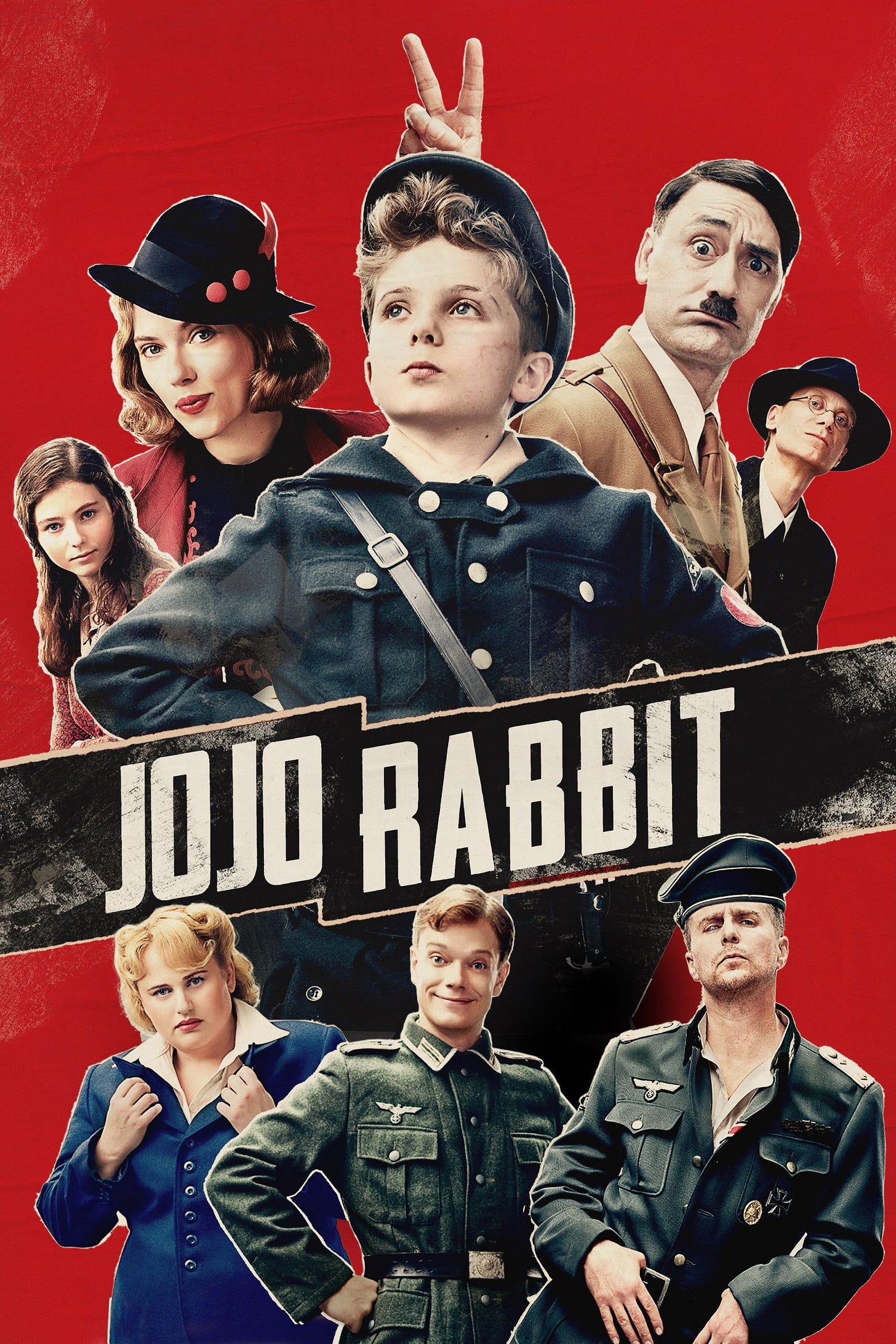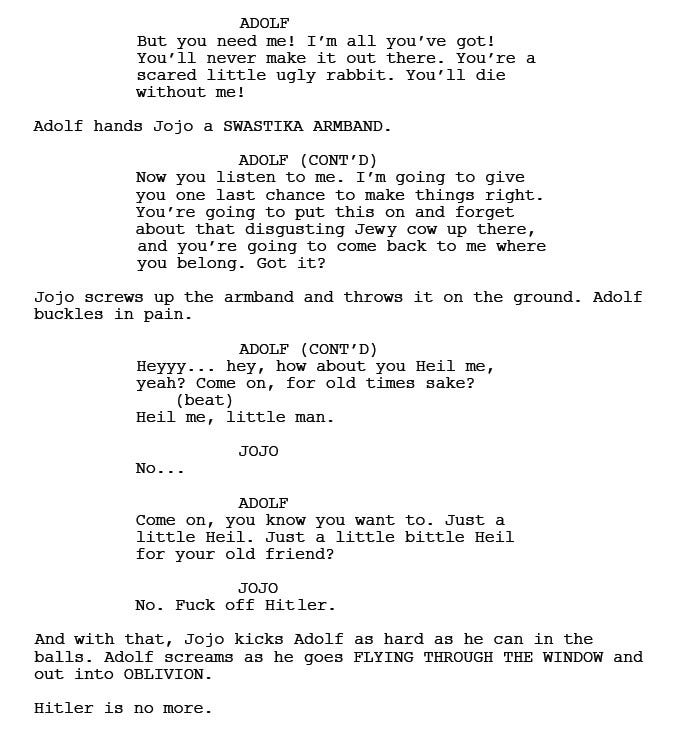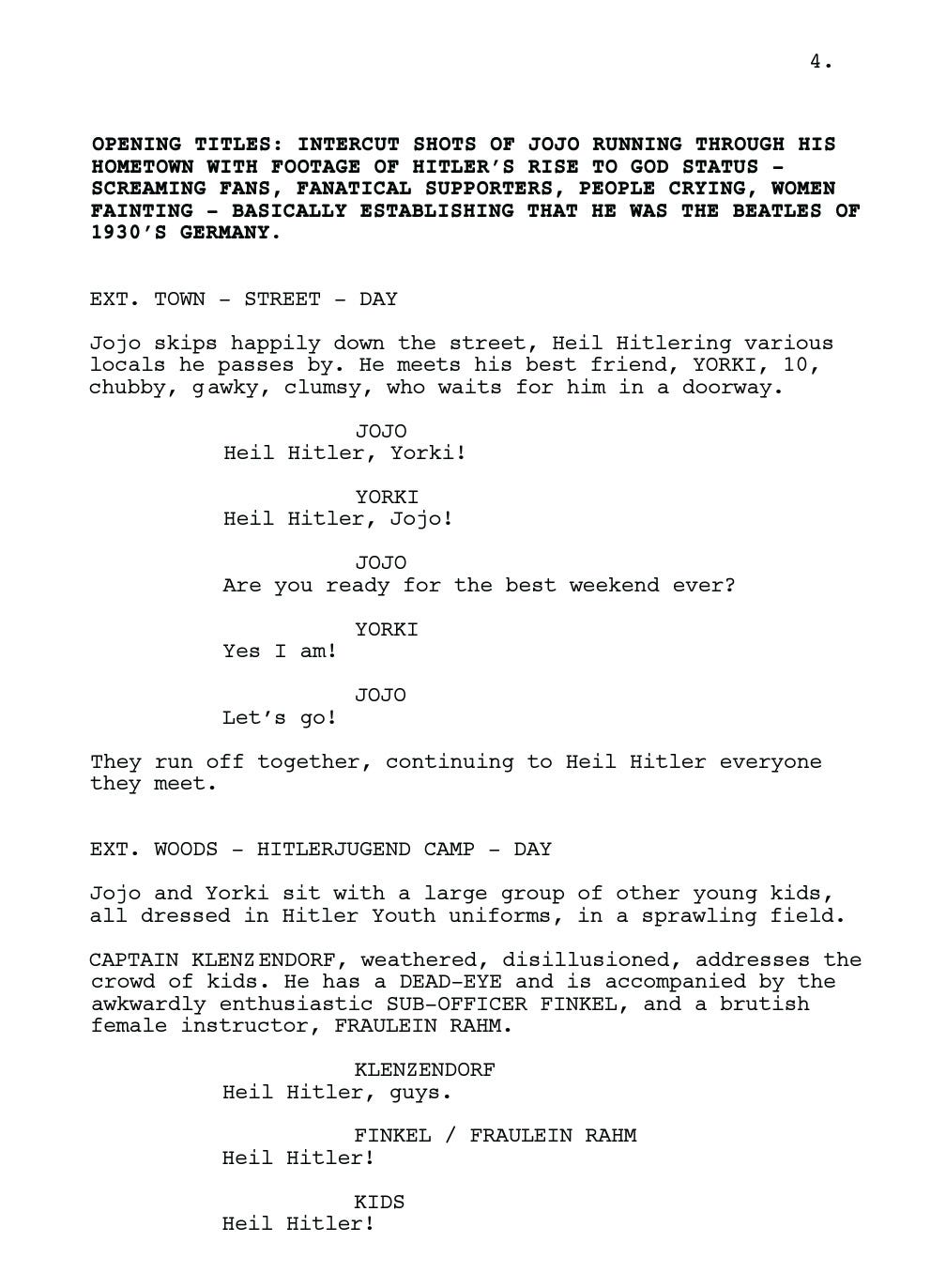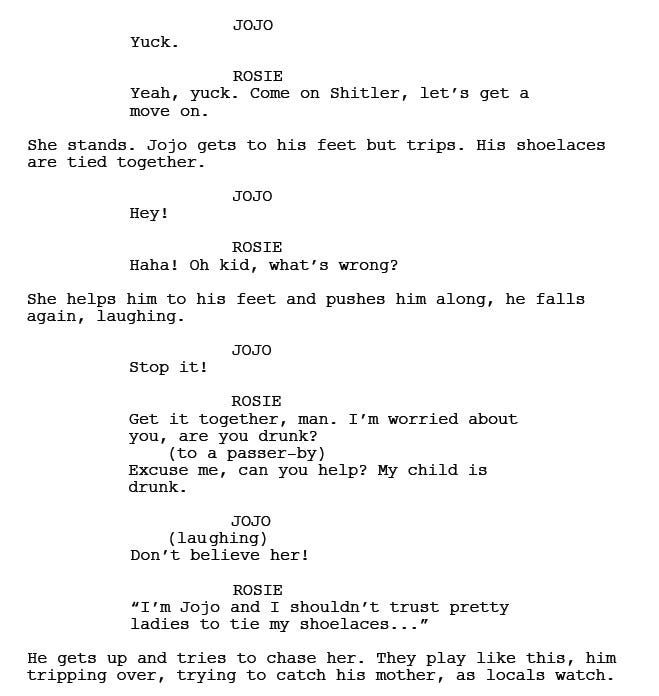Jojo Rabbit (2019) Script Review | #28 WGA 101 Greatest Scripts of the 21st Century
An amusing satire about a young boy learning to overcome his antisemitism when he reluctantly befriends the enemy: a Jewish girl.
Logline: In the final years of World War 2, a lonely German boy in Hitler’s Army discovers his single mother is hiding a young Jewish girl in their attic. With his world view turned upside down, Jojo must confront his blind nationalism with the aid of his only friend: an idiotic imaginary Adolf Hitler.
Written by: Taika Waititi
Based on: Caging Skies by Christine Leunens
Pages: 93
It is rare for an adaptation of a novel to surpass its source material—one can count them on a single hand. I haven’t read Caging Skies, the book on which Jojo Rabbit is based on, but as a screenplay, it does a very good job as far as I’m concerned. It is a playful, slightly buffoonish farce about the Nazis that is also about breaking down the barriers that make people prejudiced.
The script is set during the final months of World War 2 in a small town. Here, ten-year-old Hitler fanboy, Jojo Betzler, is off to youth camp. His only friends are a sweet kid named Yorki, and an imaginary Adolf Hitler. At camp, Jojo’s refusal to kill a rabbit earns him the derisive nickname ‘Jojo Rabbit’; his attempt to regain his pride nearly gets himself blown up. Confined to bedrest, Jojo finds his world turned upside down when he realizes that his mother, Rosie, is hiding 17-year-old Elsa Korr in their attic, and he doesn’t know what to do about it.
Not for lack of trying. First, he asks the Jewish teenager to leave. When that fails, Hitler suggests that Jojo win Elsa’s trust in order to lower her guard. Liking this idea, Jojo gets Elsa to help him write a book on Jews. The compilation of the book forms the basis of the B-plot; the more time the boy spends time with Elsa, the more he is forced to confront his blind Nazi nationalism. Gradually, Jojo starts to see Elsa as a person instead of a stereotype, causing friction with imaginary Hitler that ultimately ends in a humorous gag.
Taika Waititi makes no attempts to be subtle about the satire— then again, it’s hard to be subtle when lampooning the Nazis—but it also avoids turning into a full-blown Monty Python-esque sketch by offering quite a bit to chew on. Rosie, raising Jojo on her own, is conflicted about her son’s Nazi fervor; Elsa is despondent about whether hiding in an attic is really living. On top of everything, helping hide a Jew is a crime that could get Jojo, Elsa, and Rosie killed if caught. That’s perhaps why the scene in which the Gestapo drop by the house between pages 67-74 creates tension even despite some levity; there’s a literal danger.
The funny thing is that Caging Skies is anything but a satire. There’s no imaginary Hitler in that either; that was all Waititi. In fact, the first draft—which Waititi wrote with a friend— was far more faithful to Christine Leunens’ novel. But ultimately, Waititi did not want to make Jojo Rabbit as a straight drama. He wanted to make the Nazis both ridiculous yet human in order to show how ideologies can seduce even good people. Apart from the hook of Elsa transforming Jojo— a classic enemies-to-friends trope— there was Jojo himself. Waititi had to write a protagonist that readers could like despite his unhealthy Nazi fanaticism; he accomplished this with the rabbit incident, allowing readers to see that Jojo is still a sweet kid underneath his Nazi gear. (The late Blake Snyder would call that a “Save the Cat!” moment).
He also took the ‘write-what-you-know’ screed to heart, stealing the names of friends he knew during his time living as an artist in Berlin. Other influences include films such as Badlands and Alice Doesn’t Live Here Anymore; for the Elsa character, he turned to Heathers, imagining that Elsa would have been the cool kid in school before war broke out— perhaps she even picked on other children. Another unlikely influence was the Nickelodeon series, Rugrats, to better understand how children interpreted the world around them.
There’s more. Waititi had grown tired of World War 2 stories told from a soldier’s perspective; he wanted one that showed the war through the eyes of ordinary people who lived through those years. It was his mother, Robin Cohen, who introduced Waititi to Caging Skies in 2010. It intrigued him enough to option the book and for a draft to end up on the 2012 Black List, an annual list of the best unproduced screenplays in Hollywood. However, Waititi only ended up using the first half of the book, treating it as a jumping off point for the remainder of the story.
Despite its irreverent tone, Waititi put in a lot of time into the research. It included watching documentaries such as Hitler’s Children, The Hitler Youth, and World War 2 in Colour, as well as reading a lot of books about that time. He saw parallels between the Holocaust and the more recent Bosnian War, struck especially by the stories focusing on the experiences and treatment of children. But it wouldn’t be until around 2016-2017 that Searchlight Pictures expressed an interest in the script—on the condition that Waititi played Hitler.
In his writing, Waititi offers commentary to establish what is happening within context, as well as to build suspense.
His style is almost conversational, and he deploys onomatopoeia to great effect in creating visual imagery.
Waititi also asked himself what the characters would be like and gave them contrasting traits that clashed with their environment. For instance, despite her persecution, Elsa never sees herself as a victim; Rosie, while being pragmatic, always keeps her sense of humor.
For a character like Captain Klenzendorf, Waititi imagined as being closeted before the man put on the uniform (remember, homosexuality was a criminal offence in the eyes of the Nazi Party); where Klezendorf is concerned, Waititi does not let him off the hook even though Klezendorf knew that Elsa was not pretending to be Jojo’s sister when the Gestapo visited. Yorki might be my favorite character, though—he questions everything, and is the only one to ask aloud if they, the Germans, might be the bad guys.
At 93 pages, Jojo Rabbit is a small-knit story, limiting locations mostly to the house and keeping the number of characters small. Waititi says that earlier drafts were even smaller and sparse. One of the biggest challenges that he faced was to avoid holding himself back—he knew that he had to be prepared to write shocking things in order to say what needed to be said. For instance, Jojo’s views feel horrifying especially in his early confrontations with Elsa; but just because it’s ugly doesn’t mean you should sanitize or shy away from showing the truth as it is. The fact of the matter is that some people do think and say horrible things about other people.
Jojo Rabbit won the Academy Award for Best Adapted Screenplay at the 92nd Academy Awards (other contenders for Best Adapted Screenplay and Best Original Screenplay from that year on the WGA’s List of Greatest Screenplays of the 21st Century include Parasite, Knives Out, Once Upon a Time… in Hollywood, and Little Women). Since then, the screenplay feels an even more timely plea for people to remember that stereotypes of other groups and people only exist in our minds, nurtured by those with hateful views. It asks us to consider how much can be resolved if we treated others as people instead of stereotypes. With a dash of comedy and a buffoonish imaginary Hitler, Waititi has written a quirky tale about an unlikely friendship during a time when such relations could get them killed. It’s certainly one way to get people to talk about Nazis.
Notes:
Waititi, Taika (January 31, 2020) | Oscars 2020 Taika Waititi on Why He Made Oscar Contender Jojo Rabbit: “It Felt Scary to Me.” (Vanity Fair)
Malkin, Marc (January 31, 2020) | Taika Waititi’s Mom Explains Why She Told Her Son to Make ‘Jojo Rabbit’ (Variety)
Galuppo, Mia (November 11, 2019) | Making of ‘Jojo Rabbit’: How Taika Waititi Scored The Beatles’ Music for His Hitler Satire (The Hollywood Reporter)
Fox Searchlight (2019) | Jojo Rabbit Production Notes (Fox Searchlight Pictures)
Salisbury, Mark (January 4, 2020) | How Taika Waititi made ‘Jojo Rabbit’: “He didn’t wait for anyone to give him permission” (Screen Daily)
Guerrasio, Joe (February 10, 2020) | Taika Waititi explains the origins of his movie 'Jojo Rabbit,' which won him the best adapted screenplay Oscar (Business Insider)
Leon, Melissa (October 21, 2019) | Taika Waititi Defends His Feel-Good Nazi Satire ‘Jojo Rabbit’: ‘It’s Not a History Lesson’ (The Daily Beast)
Romain, Lindsey (October 17, 2019) | Taika Waititi on How RUGRATS and HEATHERS Influenced JOJO RABBIT (Nerdist)






